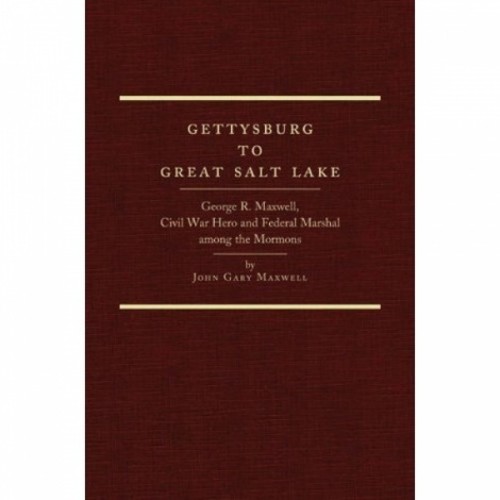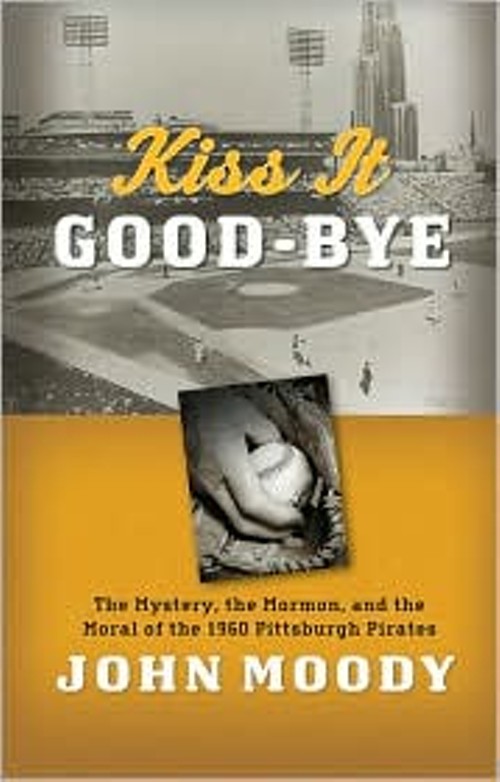New Mormon History Books
Two new books look back on Mormons in history, with varying degrees of reliability.
By Geoff GriffinIt’s hard to think of two more quintessentially “American” events than the battle of Gettysburg and baseball’s World Series—and both staples of U.S. history get a Utah twist in recent books.
Gettysburg to Great Salt Lake is a biography of George R. Maxwell, who lost fingers at Gettysburg, and then got the post-war reward of being sent to Utah to try to tame the rebellious Mormons. Kiss It Good-Bye, from local publisher Shadow Mountain, recalls the 1960 World Series and the performance of ace pitcher Vern “Deacon” Law, perhaps the first nationally recognized Mormon athlete.
Gettysburg to Great Salt Lake
Anybody like George R. Maxwell, who had Gen. George Custer personally reward him with a medal for his Civil War service and also attempted to have Brigham Young arrested for “lewd and lascivious cohabitation,” deserves a biography. Even though author John Gary Maxwell (no relation to his subject) made his career as a professor of surgery and claims to merely be an “amateur” historian, he writes like a pro in recounting this amazing life.
George Maxwell was wounded several times while fighting in many of the most famous battles in American history, resulting in having one leg amputated and one arm rendered useless. After four years of service, he ended up in Utah as a U.S. marshal, underfunded by the government and unappreciated by the Mormons as he battled both theocracy and polygamy.
Maxwell the author notes that being a Civil War hero carried no weight in Utah because, “For Mormons, the Civil War was a foreign, distant experience; they were not involved except to savor the destruction they felt America had earned from God for having spilled the blood of their prophet.” While George Maxwell was treated rudely by the Mormons, he didn’t help matters either, stating in one speech he wanted to put the Mormons in a ship and “steer them to hell by the shortest route.”
Like any good historical work, Gettysburg to Great Salt Lake makes us reflect on our own times—and it’s interesting to note what has changed, and what hasn’t, in Utah’s Mormon/Gentile divide over 150 years.
Gettysburg to Great Salt Lake: George R. Maxwell, Civil War Hero and Federal Marshal Among the Mormons
By John Gary Maxwell
University of Oklahoma Press, 2010
$39.95, 384 pages
Kiss It Good-Bye
It’s the perfect time to look back 50 years to the only World Series ever to end on a Game 7 walk-off homer. The 1960 Fall Classic featured the perennially losing Pirates of Pittsburgh—a city then known mainly for its air pollution—putting everything together behind Cy Young Award-winner Vernon Law to beat the mighty New York Yankees. It makes for a great story, and it’s too bad author John Moody isn’t more interested in telling it.
Instead, as the press materials indicate, “The book takes a look at how baseball and America have changed—not for the better.” Therefore, a typical entry reads, “Look at how Vernon Law turned out and consider if an occasional belt strapping is worse than the disintegration of the solid family life that once characterized American society.”
Whether you agree with that or not, it’s not the reason you pick up a book about the 1960 World Series. If we really want to know why America is going to hell in a handbasket, all we need to do is tune in to Glenn Beck’s Fox News show, which Moody helped create.
Besides Moody’s reactionary agenda, a couple of chapters about himself that have nothing to do with the topic of the book, and the fact that his main research appears to have been lifting quotes from Law’s own autobiography, there’s also the issue of accuracy. A casual or nonbaseball fan reading this book would not learn that Pittsburgh’s Roberto Clemente was one of a handful of players to record 3,000 career hits, has the Major League Baseball annual humanitarian award named after him and, as the first superstar from Puerto Rico, paved the way for countless Latin American ballplayers who followed him into the major leagues. There is only one brief mention—in a photo caption, not the text of the book itself—about how Clemente died while trying to deliver supplies to earthquake victims.
Moody doesn’t have time to mention any of that, because he’s too busy telling us several times that Clemente was an immigrant who “would not” speak English. He also refers to the darkness of Clemente’s skin three different times, stating once, “Come on now, he was black” (Eemphasis in original). For Moody, the Hall of Famer nicknamed “The Great One” was nothing more than a “whiner” and “malcontent.”
It leads the reader to wonder: If Moody is giving such a misleading portrait of Clemente, the best known of any of the Pirates in this book, how much of the rest of the book can we trust?
Kiss It Good-Bye: The Mystery, the Mormon, and the Moral of the 1960 Pittsburgh Pirates
By John Moody
Shadow Mountain, 2010
$24.99, 372 pages
More by Geoff Griffin
-
A Family New Year
How to ring in 2020 with revelers of all ages.
- Dec 25, 2019
-
The 12 Arts of Christmas
A delightful dozen options for your holiday entertainment needs.
- Nov 27, 2019
-
Season Kickoff
A look at what's new, or old but great, at Utah's ski and snowboard resorts for the winter season.
- Nov 13, 2019
- More »




